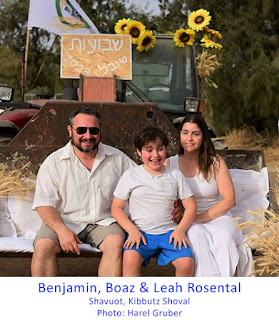In Deuteronomy, the ceremony for bringing first fruits is described simply:
You shall take some of every
first fruit…. put it in a basket and go to the place…
You shall bring it to the priest in charge at that time and say…. (Deuteronomy
26:2-5).
Five common verbs, leaving room for
interpretation and adaptation to personal or local circumstances and tastes.
The Mishnah, as usual, fills the void:
How were
the first fruits taken up [to Jerusalem]?
An ox
would go in front of them, his horns bedecked with gold and with an olive-crown
on its head…. When they drew close to Jerusalem they would send messengers ahead,
and would adorn the first fruits. The governors and chiefs and treasurers [of
the Temple] would go out to greet them, according to the rank of the entrants
they would go forth. All the skilled artisans of Jerusalem would stand up
before them and greet them… The flute would play before them, until they
reached the Temple Mount. When they reached the Temple Mount even King Agrippas
would take the basket and place it on his shoulder....
(selected from Mishnah Bikurim 3:2-4)
But an important component of the Mishna’s
ceremony is missing. In the days of the Temple, the residents of Jerusalem –
the people of the large city who bought their food in the market, whose lives
were cut off from the fields and perhaps saw rain as a nuisance – would stop
their daily routine and go out to greet the farmers and celebrate with them.
About a century ago, Rabbi Avraham
Yitzchak Hacohen Kook interpreted this Mishnah and expressed concern about the
alienation between city-dwellers and farmers:
When the
nation is morally depraved, when individuals’ eyes and heart are only upon
money, these two types, those who engage in nature and those who engage in
artifice become alienated from one another. The farmers, who dwell in villages
close to nature, will be the object of disrespect on the part of the
professionals who have figured out how to live by civilization divorced from
nature. (Ein Aya)[*]
Since then, the situation has not
improved. Supermarket shelves are full of industrialized food; the newspapers
constantly publish articles about meat grown in test tubes and wheat raised in
laboratories, and more. People demand cheap food in abundance without thinking
about the price of inputs and the cost of labor that farmers invest in crops.
Instead of applauding farmers, like the people of Jerusalem in the days of the
Temple, modern society starves them. This is not how to build the future.
Dedicated to our daughter Leah, who has just completed a doctorate about tomatoes growing in arid conditions.
[*] As
translated by Bezalel Naor and cited by Leiba Chaya David, “Ki Tavo: First Fruits.”)




No comments:
Post a Comment